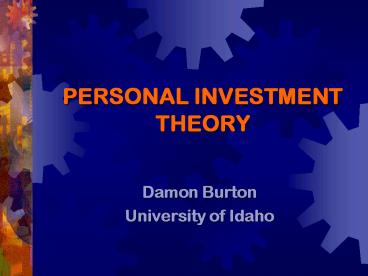PERSONAL INVESTMENT THEORY - PowerPoint PPT Presentation
1 / 25
Title:
PERSONAL INVESTMENT THEORY
Description:
PERSONAL INVESTMENT THEORY Damon Burton University of Idaho * * * * * * * * * * * * * * * * * PERSONAL INVESTMENT THEORY HISTORY Maehr & Braskamp (1994) applied ... – PowerPoint PPT presentation
Number of Views:89
Avg rating:3.0/5.0
Title: PERSONAL INVESTMENT THEORY
1
PERSONAL INVESTMENT THEORY
- Damon Burton
- University of Idaho
2
PERSONAL INVESTMENT THEORY HISTORY
- Maehr Braskamp (1994) applied Achievement Goal
Theory (AGT) to business - Identified 8 major goals that define success and
failure in business - Developed the Inventory of Personal Investment
(IPI) to measure key components of the theory.
3
PERSONAL INVESTMENT
- Investment is a business-oriented term for
motivation. - Individuals may have multiple incentives or
goals that they are trying to attain in any
business situation. - Incentives interact with (a) sense-of-self
variables that define traits that influence
motivation, and (b) perceived options or the
other alternatives you have to meet important
incentives. - The importance of different investment options
may vary according to situational and contextual
factors.
4
MEANING CORE OF PERSONAL INVESTMENT
5
FACTORS COMPRISING INFLUENCING MEANING
6
PERSONAL INCENTIVES
- Personal incentives are business-oriented terms
for goals. - Individuals may have multiple incentives or
goals that they are trying to attain in any
business situation. - The more incentives individuals are striving to
attain in a situation, the generally higher the
motivation and the more resilient to failure and
adversity. - The importance of different SOS variables may
vary according to situational and contextual
factors.
7
8 PERSONAL INCENTIVES
- Competition,
- Power,
- Excellence,
- Task Involvement,
- Affiliation,
- Social Concern,
- Recognition, and
- Financial Rewards.
8
8 PERSONAL INCENTIVES
- Competition gaining satisfaction feeling
positive about yourself when you win.
Competitive like to win. - Power seeking out enjoying positions of
leadership authority. Confident working with
others and trust intuitions in making judgments. - Excellence continually thinking of ways to
improve, working hard enjoying solving
problems. - Task Involvement totally involved in what they
are doing, regard work as exciting fun, like
challenges and enjoy solving challenging
problems.
9
8 PERSONAL INCENTIVES
- Affiliation liking to be in the company of
friends, enjoy helping others, and are friendly,
trusting and show affection for others. - Social Concern gain satisfaction by sacrificing
personal gains for others, committing themselves
to social and civic causes and follow golden
rule. - Recognition want recognition for what they do
work harder when receiving recognition. Want
respect from co-workers, and do best work when
others encourage them and praise them. - Financial Rewards value money, seek positions
that provide bonuses and extra income. Money is
an indicator of success monetary rewards prompt
best work.
10
SENSE-OF-SELF VARIABLES
- Sense-of-self (SOS) variables are personality
traits that influence motivation. - Individuals may be strong on some SOS variables
and weak on others. - The more SOS variables that are strong, the
generally higher the motivation and the more
resilient to failure and adversity. - The importance of different SOS variables may
vary according to situational and contextual
factors.
11
3 SENSE-OF-SELF VARIABLES
- Competence,
- Self-Reliance, and
- Goal-Directedness.
12
3 SENSE-OF-SELF VARIABLES
- Competence determined by (a) consistently
achieving ones goals (b) taking credit for
that success as indictive of ones skills or
personally desirable attributes. - Self-Reliance -- taking responsibility for
pursuing and achieving ones goals. - Goal-Directedness consistently
enthusiastically pursuing ones chosen goals.
13
PERCEIVED OPTIONS
- Perceived options are a way to operationalize
alternate choices or goal opportunities. - Individuals may have different types of perceived
options in different situations. - The more perceived options, the generally lower
the motivation for the task at hand and the less
resilient one is towards failure and adversity. - The importance of different perceived options
vary according to situational and contextual
factors.
14
2 PERCEIVED OPTIONS
- Organization advancement, and
- Marketability.
15
2 PERCEIVED OPTIONS
- Organizational advancement extent to which
employees feel that they can advance in the
organization are not stuck in their current
jobs. - Marketability extent to which employees
perceive that they can find good alternative jobs
or career opportunities and feel positive about
their future.
16
MERCANTILISTS VERSUS ACADEMICS
17
COLLEGE VS UNIVERSITY FACULTY
18
HIGH ACHIEVERS VERSUS EVERYONE ELSE
19
ENHANCING PERSONAL INVESTMENT
- Person-focused strategies
- Job-focused strategies
- Organization-focused strategies
20
PERSON-FOCUSED STRATEGIES
- Selecting motivated people
- Placement of putting the right person in the
appropriate job - Developing new goals and sense-of-self variables
in individuals.
21
JOB-FOCUSED STRATEGIES
- change job itself
- change larger organizational network in which the
job is performed - social aspects
- inherent attractiveness
- evaluation
22
ORGANIZATION-FOCUSED STRATEGIES
- establishing communicating a mission
- establishing salient goals
- concern for individual in the organization
- delegate power
- identify and reward excellence
23
WHICH INCENTIVES ARE MOST HELPFUL?
- Which of these personal incentives are more
personally controllable and thus make success
easier to attain? - Which personal incentives are less personally
controllable and thus make success harder to
attain?
24
- Use Personal Investment Theory to profile Brett
Favres motivation to play football for the
Minnesota Vikings next season.
25
- THE END































